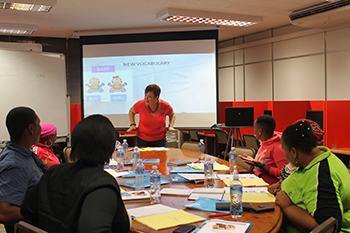Latest News Archive
Please select Category, Year, and then Month to display items
23 April 2020
|
Story Cornelius Hagenmeier
|
Photo Pixabay

The iKudu project, which is an European Union-funded Capacity Building in Higher Education (CBHE) project, has recently launched its blog, which aims to amplify the diverse voices of all iKudu stakeholders. In this space, members of the iKudu team will regularly share their views on the project and related international education topics.
The iKudu project focuses on developing a contextualised South African concept of Internationalisation of the Curriculum (IoC), which integrates Cooperative Online International Learning (COIL) virtual exchanges. The project was launched by the UFS in 2019, together with nine European and South African partner universities. It is funded by the European Union’s Erasmus+ programme with EUR999 881 (approximately R20 million) and is implemented over a three-year period.
The iKudu project is based on the fundamental belief that it is necessary to rethink internationalisation in an uncertain world. First, it is crucial to recognise and transform the power dynamics underlying international academic collaboration. Second, it is essential to develop pedagogies that allow every student to participate in international education, integrating technology where appropriate.
However, while all stakeholders agree on the fundamental tenets of the project and its principal goals, all iKudu stakeholders contribute different perspectives. In the blog, the iKudu stakeholders will provide a space for intellectual discourse on the project and related international education topics, which will allow constructive and critical engagement.
The link to the blog can be found at: https://www.ufs.ac.za/ikudu/ikudu-blogs/Transforming-Curricula-through-Internationalisation-and-Virtual-Exchanges
UFS provides sign language skills to locals
2016-02-12

Susan Lombaard teaching at one of the sessions
Photo: Valentino Ndaba |
The public and private sectors are becoming more aware of the need for effective communication between employers, employees, and clients who use Sign Language. Given that Sign Language is the first language of approximately 600 000 people in South Africa, competence in the language means taking the first step towards more inclusive service delivery.
Shout Out Loud - a project that promotes Sign Language - has signed up Bloemfontein Celtics, Centlec, Beyond Boundaries, and the Mangaung Municipality on a Basic South African Sign Language course at the University of the Free State.
No miscommunication
Susan Lombaard, the Acting Head at the Department of South African Sign Language, was one of the lecturers who presented the 40-hour accredited course every Friday from 15 January-12 February 2016. Other lecturers who were responsible for training were Emily Matabane and Tshisikhawe Dzhivani.
Lombaard believes that learning Sign Language bridges the gap between the hearing and those who have impairments. “The benefit is that there will be no miscommunication. It happens that a deaf person walks into a bank or municipality offices and there is no communication. They need to write which is humiliating for that person.”
Towards a promising future
According to Goodwill Mokoena, Project Manager at Beyond Boundaries, the project will continue annually, and a larger intake of government departments and non-governmental organisations is expected in 2016.He also indicated that Shout Out Loud has achieved substantial success in its involvement with the Bartimea School for the Blind and Deaf.
Shout Out Loud selects one pupil every month, and flies them to Johannesburg to interpret on Bloemfontein Celtics’ magazine show. It is the only magazine show in South Africa that has a sign language interpreter. “The school has been achieving 100% in matric results because the pupils are selected on merit. This has enhanced their academic performance in such a marvelous way,” said Mokoena.